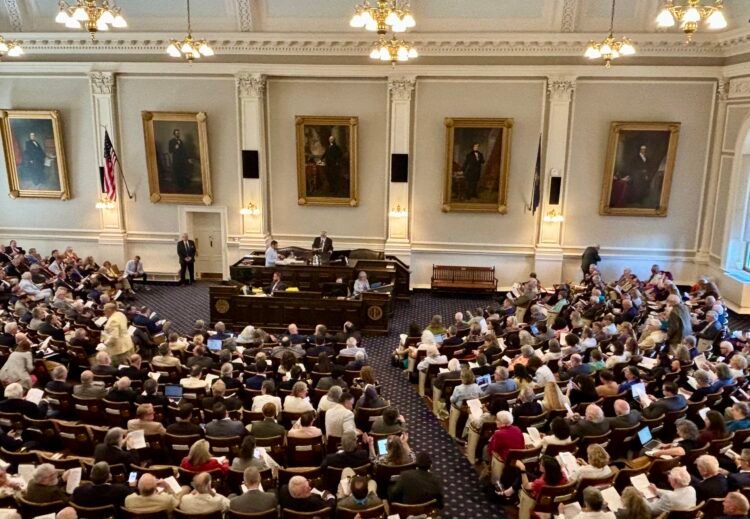This tale used to be up to date on June 13 at 5:24 p.m. to incorporate remark from the ACLU of New Hampshire.
The New Hampshire Space struck down a invoice to legalize hashish Thursday, in a dramatic finish for a invoice that revealed deep disagreements between the Space and Senate.
Balloting 178-173, the chamber rejected an tried compromise with the Senate on Space Invoice 1633. That invoice would have legalized using hashish for someone 21 and older beginning in 2026, and would have allowed the introduction of as much as 15 retail places overseen by means of the state.
However pro-legalization supporters within the Space had antagonistic the retail manner counseled by means of Gov. Chris Sununu and the Senate, and have been annoyed when the Senate endured to cross that model. The Space voted to desk the invoice after which later adjourned for the summer time, finishing all probabilities that the invoice might be revived.

Frustrations have been prime. “The perplexing factor in regards to the immortality of this invoice is that actually no one on this frame likes this invoice,” stated Rep. Jared Sullivan, a Bethlehem Democrat, simply forward of the vote.
Sununu had liked a franchise type that will permit companies to shop for licenses to run hashish shops, however would give the state’s Liquor Fee top-down regulate over retailer structure and promoting.
Sununu stated giving the state extra regulate used to be necessary to determine safeguards for youngsters and most people. However pro-cannabis Space individuals disagreed, arguing the franchise type would create an efficient monopoly over gross sales that will squelch innovation. They driven for a type that will permit retail licensees extra freedom over shops.
The vote to kill the regulation used to be a notable political flip for the Space. For greater than a decade, bipartisan majorities of the Space have handed hashish legalization expenses, just for bipartisan majorities of the Senate to reject them.
However in Would possibly 2023, that dynamic modified when Sununu – an established legalization opponent – introduced he would signal a hashish legalization invoice that met positive actual standards, which incorporated tight state controls. The governor’s vow caused a yearlong effort to cobble in combination a invoice that might do this. However individuals of the Space bristled on the governor’s retail type, and the 2 chambers had endured to conflict within the weeks forward of Thursday.
Remaining week, representatives from the Space and Senate attempted to insert compromises. The Senate agreed to extend hashish business illustration on a hashish regulate board – which might set rules – after Space negotiators complained they didn’t have a seat on the desk.
Negotiators additionally added provisions that will make it more straightforward for the state’s present choice remedy facilities – which recently dispense scientific marijuana – to procure some of the licenses for retail hashish.
And whilst the total legalization of hashish shouldn’t have kicked off till 2026, the compromise invoice would have in an instant raised the decriminalization limits, permitting anyone to own as much as an oz of hashish with out dealing with legal consequences. These days, as much as three-quarters of an oz of hashish is decriminalized in New Hampshire.
Rep. Erica Layon, the unique sponsor of the invoice, took to the ground to strengthen the compromise invoice. Whilst the general bundle used to be now not her ideally suited manner, she stated, “We’ve the risk to get the ball rolling in New Hampshire.”
Layon argued that for the reason that legalization within the ultimate bundle didn’t kick in till 2026, lawmakers had a few years to tweak the rollout of the invoice with long term expenses.
However at the Space ground Thursday, different advocates for legalization stated that the Senate-amended invoice used to be a nonstarter.
To Sullivan, the introduction of higher powers for the Liquor Fee can be unacceptable enlargement of the state executive.
“Does someone in right here in truth consider that we will reel in a newly empowered executive forms when they’ve spent hundreds of thousands of greenbacks? Does someone truthfully consider it is going to be simple to tug again energy from an unelected company as soon as they have got it?”
Different advocacy teams took a distinct view. The American Civil Liberties Union of New Hampshire lamented the Space’s vote Thursday, arguing that the frame had thrown away an opportunity to cross legalization for all Granite Staters – irrespective of the retail type used.
“Pushing legalization off but some other 12 months makes transparent that lawmakers are keen to forget about the desire of their very own constituents and are k with proceeding to needlessly ensnare over 1000 folks – disproportionately Black folks – in New Hampshire’s legal justice gadget annually,” stated ACLU Government Director Devon Chaffee in a remark after the vote.
She added: “Marijuana legalization is not only a political squabble in regards to the financial advantages – the warfare on marijuana has real-life affects. Whilst politicians argue, the affects of those arrests will proceed to smash lives.”
Previous within the day Thursday, HB 1633 had handed the Senate 14-10, with Republican Sens. Daryl Abbas of Salem, Dan Innis of Bradford, Tim Lang of Sanbornton, Keith Murphy of Manchester, and Howard Pearl of Loudon becoming a member of 9 Democrats to strengthen it. Manchester Democratic Sen. Lou D’Allesandro joined 9 Republicans to oppose it.
On Wednesday, Sununu stopped wanting vowing to signal the most recent model of the invoice, however defended his manner.
“You’ve billboards in every single place Massachusetts that tout marijuana, and the way it’s simple get admission to,” he advised newshounds. “You’ve places in different states which are at once adjoining, in within reach colleges, and I feel that’s an enormous downside.
“All of those are items that we attempted to take into accounts if we have been going to do it, expand the most productive gadget, now not simply within the area, however more than likely within the nation.”















